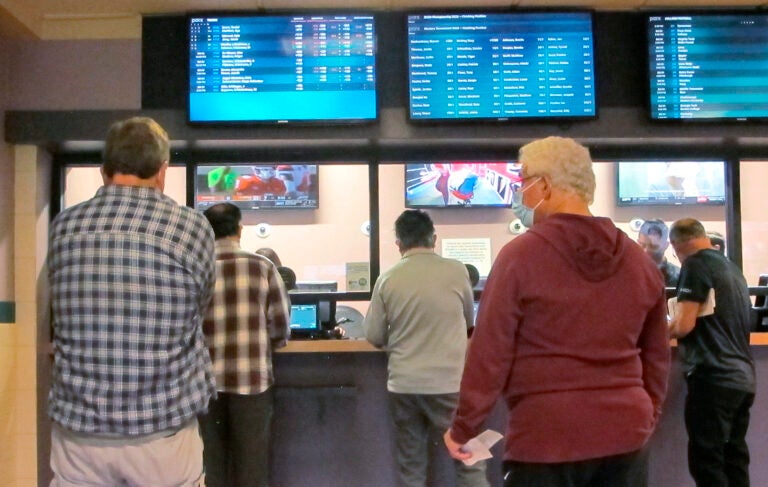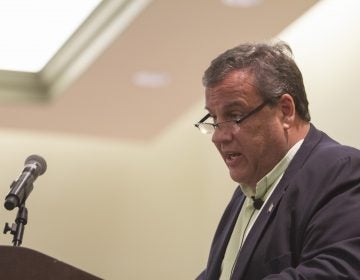N.J. vote would allow sports betting on all college games
A bill calling for a public referendum in 2021 was amended Monday to significantly expand collegiate sports betting in the state.

Customers line up to make sports bets at Freehold Raceway in Freehold, N.J. on Oct. 24, 2020. (AP Photo/Wayne Parry)
New Jersey lawmakers want to amend the state constitution to allow sports betting on all major collegiate games, removing a big restriction in a wagering market that is smashing national sports betting records.
A bill calling for a public referendum in 2021 was amended Monday to significantly expand collegiate sports betting in the state. Current state law prohibits betting on college games played anywhere in New Jersey, and it also bans betting on games played in other states involving New Jersey teams.
The measure was approved by the Senate Budget Committee, the first of several steps required before it can be placed on next year’s general election ballot.
Sen. Paul Sarlo, a northern New Jersey Democrat who represents the area including MetLife Stadium in East Rutherford, where the NFL’s Giants and Jets play, said lawmakers decided to move forward with a more sweeping college sports betting bill.
When introduced last month, the bill would have asked voters to approve betting only on New Jersey college playoff or championship games. The new measure would allow it on regular-season games as well.
“We got the blessing of the NCAA and the Attorney General’s Office and a lot of the teams so we figured why not just go for the whole thing?” Sarlo said.
It is aimed primarily at events like the NCAA basketball championship tournament, which was last held in New Jersey at Newark’s Prudential Center in 2011. The arena will host one of the tournament’s regional competitions in 2025.
Officials also hope MetLife Stadium will be chosen to host college football bowl games.
“Some of the top teams will be here,” Sarlo said. “There will be a lot of activity and betting.”
A message seeking comment on the legislation was left with the NCAA.
Christina Renna, president of the Chamber of Commerce of Southern New Jersey, said sports betting has unquestionably helped the region’s economy, including the nine Atlantic City casinos.
“All of this is more bets and more revenue coming into the state,” she said.
New Jersey’s fast-growing sports betting market blew past its own national record in September, taking in more than $748 million in bets from sports gamblers finally able to wager on football amid the coronavirus outbreak.
Atlantic City’s casinos and the three horse racing tracks that offer sports betting easily surpassed the national monthly record they set just a month earlier, when $668 million was wagered on sports in August.
Both figures easily eclipsed what had been the U.S. record of $614 million set in Nevada in November 2019.
New Jersey’s October sports betting figures are to be released on Friday.
Over the first nine months of this year, New Jersey casinos and tracks have taken in nearly $3.3 billion in sports bets alone. That equals or surpasses what Atlantic City used to make in an entire year from casino gambling before sports betting was legalized.
New Jersey won a U.S. Supreme Court case in 2018 allowing all states to offer legal sports betting should they so choose. It quickly dominated the East Coast market and challenged Nevada for the national lead.
The $748 million includes the total amount of bets accepted by the casinos and tracks in September; after paying off winning bets and expenses, they kept $45 million of that total.
WHYY is your source for fact-based, in-depth journalism and information. As a nonprofit organization, we rely on financial support from readers like you. Please give today.






